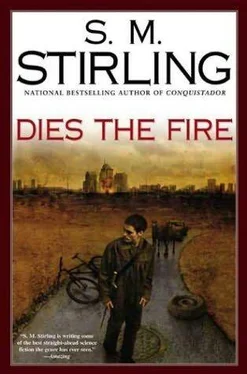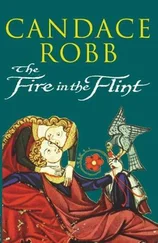S. Stirling - Dies The Fire
Здесь есть возможность читать онлайн «S. Stirling - Dies The Fire» весь текст электронной книги совершенно бесплатно (целиком полную версию без сокращений). В некоторых случаях можно слушать аудио, скачать через торрент в формате fb2 и присутствует краткое содержание. Жанр: Фантастика и фэнтези, на английском языке. Описание произведения, (предисловие) а так же отзывы посетителей доступны на портале библиотеки ЛибКат.
- Название:Dies The Fire
- Автор:
- Жанр:
- Год:неизвестен
- ISBN:нет данных
- Рейтинг книги:5 / 5. Голосов: 1
-
Избранное:Добавить в избранное
- Отзывы:
-
Ваша оценка:
- 100
- 1
- 2
- 3
- 4
- 5
Dies The Fire: краткое содержание, описание и аннотация
Предлагаем к чтению аннотацию, описание, краткое содержание или предисловие (зависит от того, что написал сам автор книги «Dies The Fire»). Если вы не нашли необходимую информацию о книге — напишите в комментариях, мы постараемся отыскать её.
Dies The Fire — читать онлайн бесплатно полную книгу (весь текст) целиком
Ниже представлен текст книги, разбитый по страницам. Система сохранения места последней прочитанной страницы, позволяет с удобством читать онлайн бесплатно книгу «Dies The Fire», без необходимости каждый раз заново искать на чём Вы остановились. Поставьте закладку, и сможете в любой момент перейти на страницу, на которой закончили чтение.
Интервал:
Закладка:
He winced slightly, then shook his head and rolled a cigarette, using only his right hand and offering the makings around.
"No, thanks," Havel said. "Wouldn't want to get into the habit again-not much tobacco grows around here."
Once Hutton had lit up, Havel waved towards the cabin and the congealed pool of blood still left on the veranda. "Stuff like this is probably happening all over the world. Most people aren't going to make it through the next year even out here in the boondocks, and it's going to be worse in the cities, a lot worse. I'd like to be one of the minority still living come 1999. That's going to mean teamwork. Sitting around arguing at the wrong moment could get us all killed."
Signe Larsson spoke up: "Dad, the rest of you, we should stick with Mike."
"Yup," Eric concurred. "I'm sort of fond of living myself."
Astrid nodded, silent. Her father spoke: "Money's gone, the whole modern world's gone. We'd all be dead four times over without Mike. I'm for it."
Hutton took a drag on his cigarette and spoke in his slow deep voice. "Man alone, or a family alone, they're dead or worse now. I found that out. Mike here, I've got good reason to trust him, and I misdoubt he'll get drunk with power. So if he wants to ramrod this outfit, I'm for it."
Havel held up a hand. "Let's not get ahead of ourselves," he said. A deep breath: "We have to have someplace to go, and some way of making a living and defending ourselves once we get there. That means getting land and seed and stock and tools however we can, and I sort of suspect it also means fighting to keep it. OK, that's not something a man can do alone; and we here know each other a bit."
He shifted his shoulders, a gesture he used at the beginning of a task; usually he wasn't conscious of doing it, but this time he noticed: and remembered his father doing the same.
"But I'm not going to take responsibility without authority. If you want to stick with me, well, I hope I'm sensible enough never to think I know everything and don't need advice, but somebody has to be in charge until things are settled. I think I'm the best candidate. We're going to have to pool everything and work together like a military unit, and a camel is a horse designed by a committee."
He caught each pair of eyes in turn: "For? Against?"
The Larssons nodded, looked at each other, and then raised their hands.
"For!" they said in ragged unison.
Hutton puffed meditatively on his cigarette again and then raised his hand in agreement. "Count me in too. Think I can speak for Angel and Luanne."
Havel nodded. "Glad you said that," he said. "I don't deny you and your horses would be very useful; and your family were pretty impressive too, on short acquaintance. You're a horse breaker, I take it?"
"No, sir, I am not," Hutton said, with dignified seriousness. "What use is a broken horse? I am a horse wrangler and trainer. Anything a horse can do, I can train into it."
Then he laughed without much humor. "And it's a trade I took up so I could work for myself. Don't see much prospect of that here. I'm a stranger, and a black one at that. Might get a bunk and eats with some rancher or farmer, yeah, but not on good terms, I reckon. Sharecrop-ping or something like."
"We're all in that situation," Havel said. "When there just isn't enough to go around, people will look to their own kin and friends first."
He ran a thumb along the silky black stubble on his jaw. "I expect some refugees will get taken in, especially where there aren't too many, but Will pegged it. They'll be the hired help, and hire will be just their keep at that, sleeping in the barn and eating scraps. It'll be worse, some places- human life's going to be a cheap commodity."
"We could all go to our place in Montana," Eric Larsson said. "The ranch: we've got horses there, and there's the grazing-lots of cows around there. Or there's the summer farm in the Willamette. The ranch is a lot closer, though."
Ken shook his head. "I don't think Montana would be a good idea," he said slowly. "We'd be strangers there. That land used to belong to the Walkers: and with nobody to tell them no, I suspect they'll simply take back the property and the stock; the area's full of their relatives and connections. They were always polite when we did business, but I could tell they weren't too happy about needing my money."
"Yeah," Signe said. "I know I dated Will for a while, sort of, or at least hung around him, but it was me who called it quits. There's something creepy about him, and his whole family."
Her father looked at her with surprise, then shrugged. "I'd go for the farm, if it weren't for all the people in the Willamette Valley. Going on for two million: it'll get very ugly."
"What's it like?" Havel asked him. "A real farm, or just a vacation house?"
"My grandfather bought it for a country place back before the First World War, in the Eola hills northwest of Salem," Ken said.
For a moment he smiled, then winced. "Mary liked it: nice big house-Victorian, modernized-and about seven hundred acres, two-fifty of that in managed forest on the steeper parts. Gravity-flow water system, about thirty acres of pinot noir vines we've put in over the last ten years-the winery is all gravity-flow too, by the way-some old orchards, and then quite a bit of cleared land, all of it board-fenced. In grass, we ran pedigree cattle on it and raised horses, but it could grow anything. Some sheds, barns, stables. We know the neighbors well, too, and get along with most of them; the Larssons have been spending summers there for a long time."
If any of the neighbors are still alive in a couple of months, that might be an asset, Havel thought. Unless someone's simply moved in and taken over.
Ken went on: "Long-term, there's something else to think about." He waved a hand around them.
"There's a lot of farming and ranching here in the interior, yes. For a year or two, or four or five, it's going to be better-off than most places. The Larssons made their first pile trading wheat from Pendleton and the Palouse down the Columbia to Portland. But a hell of a lot of the crops here these days depend on things like center-pivot irrigation, or deep wells: and the dryland farming: well, it only yields really well with mechanization on a big scale, where one family can work thousands of acres. That way it doesn't matter if you get a low yield, or lose every fourth crop to drought, because you're handling so many acres."
"You mean quantity has a quality all its own," Havel said.
Ken nodded. "If you're doing it by hand and horse, it takes just as much labor to work an acre of twelve-bushel wheat land as it does one that gives you forty. With the sort of preindustrial setup we're being thrown back on, that's the basic constraint on your standard of living. And the lower the productivity, the harder the people on top have to squeeze to get a surplus."
Havel 's brow furrowed. You know, that makes an uncomfortable amount of sense, he thought. And Ken Larsson is no fool. Not any sort of a fighting man, but he can think, and he's got the best education of any of us here.
"All right," he said. "Unless we see a better opportunity along the way, I'd say we head for the Willamette."
"Ummm: " Eric was a lot more bashful than he'd been. "What about all the people, Mike? Dad said it. The farm's only fifty miles from Portland and a lot closer to Salem."
Havel looked away for a moment, then met Ken Lars-son's eyes. He gave a slight nod of agreement, and the younger man went on: "Eric, it's a long way to the Willamette on foot; and I don't intend to hurry. By the time we get there. overpopulation is not going to be that much of a problem."
"Ouch," Signe said with a wince. "Still: "
"Nothing we can do about it, I suppose," Eric said; they looked at each other in surprise at their agreement.
Читать дальшеИнтервал:
Закладка:
Похожие книги на «Dies The Fire»
Представляем Вашему вниманию похожие книги на «Dies The Fire» списком для выбора. Мы отобрали схожую по названию и смыслу литературу в надежде предоставить читателям больше вариантов отыскать новые, интересные, ещё непрочитанные произведения.
Обсуждение, отзывы о книге «Dies The Fire» и просто собственные мнения читателей. Оставьте ваши комментарии, напишите, что Вы думаете о произведении, его смысле или главных героях. Укажите что конкретно понравилось, а что нет, и почему Вы так считаете.












